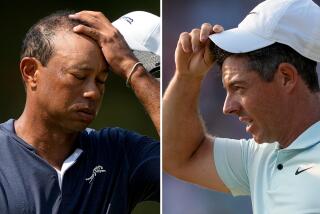Tiger’s Tale Not a Happy One
- Share via
BETHESDA, Md. — The last anyone at the U.S. Open saw of Tiger Woods on Thursday, he was sprinting toward the parking lot, clay feet and all.
In fleeing the fans, the questions, the nine strokes that separate him from first place, he left behind this single wrinkled reminder:
He is still only 21.
He still has the maturity of some college kid who attends his commencement wearing nothing underneath his gown.
He is not a messiah, merely a kid being cast as one.
Which is exactly what he has spent the last two months trying to tell us.
“I’m just 21 years old, and I’m going to make mistakes,” he has often said since winning the Masters.
Message received. It all made sense Thursday during five hours of club slamming and glaring and brave-but-often-brainless golf.
To win the Grand Slam, he’s now going to have to hit one. He will have to equal the biggest comeback in U.S. Open history after the first round.
And he will have to do it with an attitude that miffed other golfers, alienated some fans and wrecked his Thursday afternoon with a four-over-par 74.
He blew off the use of woods on all but three tee shots, and was consistently outdriven by one of his playing partners, Tom Lehman, who is two shots off the lead.
He blew off the theory at Congressional that you do not aim directly for the pin if it is in the back left corner of the 11th and 18th greens. He took two chances, missed both times, took two double bogeys.
He blew off some fans by ignoring them after the round and barely acknowledging their existence during it.
On the 15th hole, as he approached his ball in the rough, a toddler shouted, “Hi, Tiger!”
The crowd laughed nervously. Woods just glared. Some of those people will remember.
Finally, he blew off a postmatch news conference, no big deal to you, but symbolic of the clash between his image and reality.
This long has been a sport in which players would almost rather sign the wrong scorecard than refuse an interview or autograph.
“He finished poorly, and I’d be upset too,” Lehman said. “You have to cut him some slack. He has a lot of pressure on him. Everybody ought to just let him go.”
That would be nice, if it were not impossible.
Fans stood 10 deep in some places Thursday. Three television workers documented his every step for national telecasts that included Woods’ hawking this shoe or that.
He has become so big here that his other partner, defending champion Steve Jones, couldn’t help but joke about it.
When Woods stepped to the first tee with Jones in tow, fans gave Woods a standing ovation.
“And now,” announced Jones, “let’s hear it for Tiger Woods!”
The fans laughed, and Tiger smiled.
“I felt like part of history,” Jones said. “I was just trying to enjoy the day.”
A couple of hours later, Woods was having none of it, throwing his clubs into his bag or angrily swinging them through an empty rough.
Maybe it was the baby who cried during his backswing. Maybe it was the constant whir of an eavesdropping helicopter. Maybe it was those three missed or lipped putts in the first five holes.
Whatever, he was two under for the first 10 holes, he had found every fairway, he had a chance to improve that score with a good 135-yard wedge shot on his second attempt at the par-four 11th.
But he couldn’t help himself. He shot it deep left despite high rough near the hole, and landed in that rough. Two bad chips later, and he had his first double bogey.
“You have to know, you just can’t hit every shot like you want to every time,” Jones said.
Jones had been trying to talk to Woods between holes. He backed off a little.
“Tiger tightened up after that,” Jones said. “I was like, whatever.”
Woods took a chance again on 18, the par-three closing hole, when he plopped a shot off the left side of the green and into the water. Lehman and Jones played it safe and to the right for eventual pars.
“Those two shots were to the worst places you can hit it on this course,” Jones said.
Another double bogey, a swift walk through hordes of autograph seekers, a sprint to his car.
Woods was cornered for a five-minute interview by a pool reporter, during which he mostly answered, “I don’t know.”
Which is also what he has been trying to tell us.
He doesn’t always know. We should not expect him to always know.
Advertisers willing to heap millions on him also should not expect him to always know.
For now, perhaps they should think about spending their money more wisely.
For now, perhaps we should think about doing the same with our expectations.
More to Read
Go beyond the scoreboard
Get the latest on L.A.'s teams in the daily Sports Report newsletter.
You may occasionally receive promotional content from the Los Angeles Times.











